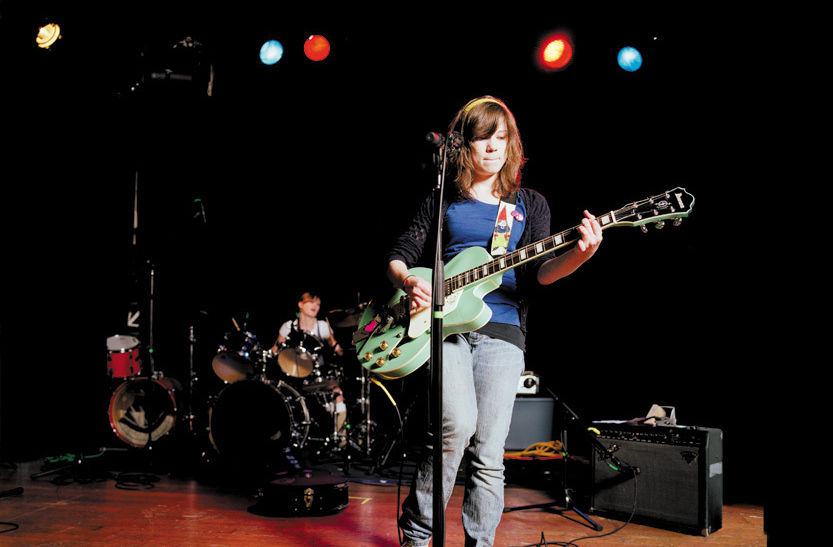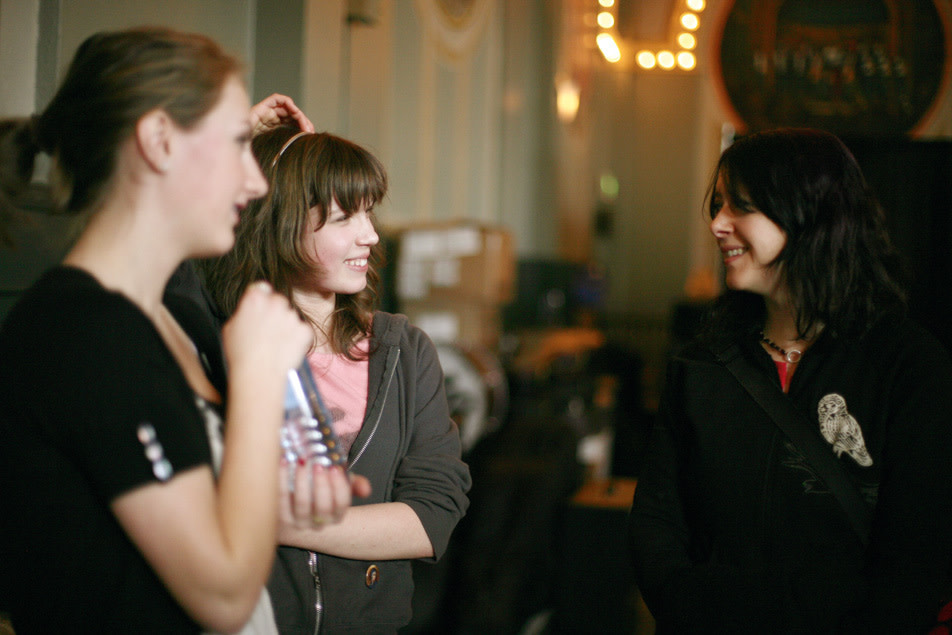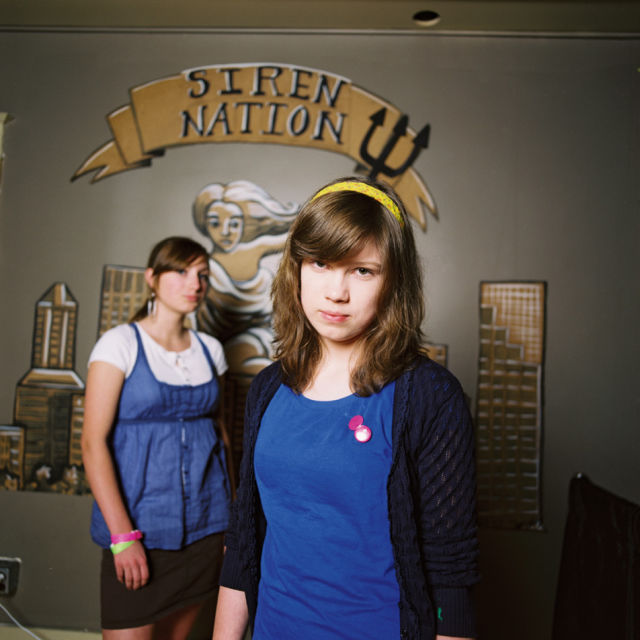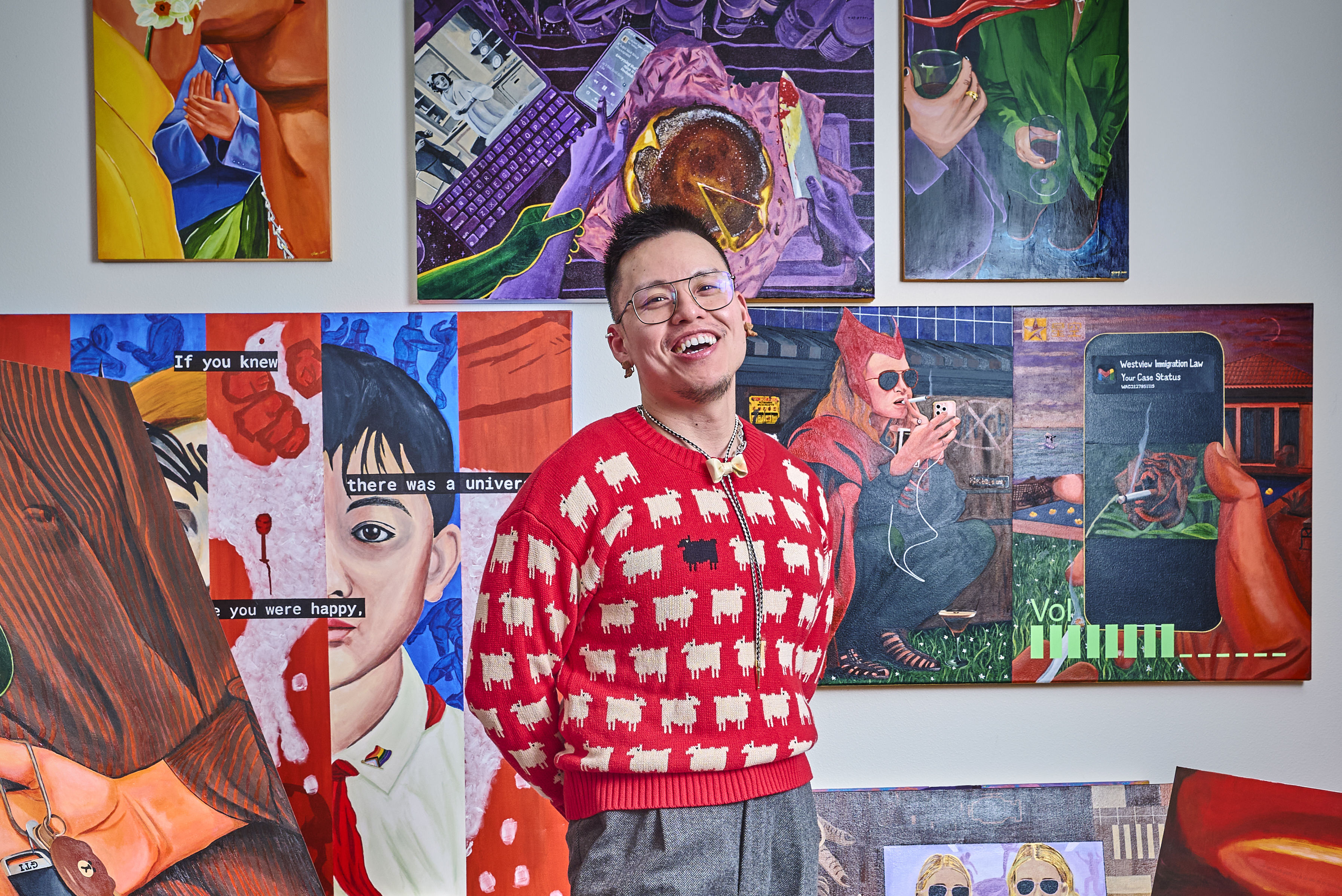Fly Girls

Image: Alicia J. Rose
It’s Friday night at Portland’s Wonder Ballroom, and the band onstage isn’t old enough to attend its own show. About a hundred fans casually swill beer from plastic cups, but it will be seven years before Katie Alto and Úna Rose—otherwise known as the duo Blübird—can drink legally. Hell, they haven’t even started high school yet.
Úna Rose, the 14-year-old lead singer and guitarist, stands with a straight back, her legs slightly scissored. Confident and calm, she stares directly into the eyes of audience members as she strums her sea green guitar. Behind her, Katie Alto, 13, pounds away at her drums, her chin angled toward her chest so that her dark brown bangs fall in front of her face. A disco ball hanging from the high, vaulted ceiling sends spots of light, like schools of little silver fish, swimming across the historic former dance hall.
Between songs, it’s Alto who handles most of the stage banter, and the minute she lowers her drumsticks, her demeanor changes entirely. No longer the cool, aloof musician, she suddenly becomes—well, a kid. She brushes her hair out of her eyes and smiles wide, revealing metal braces on both rows of teeth. Then, in a voice that’s still high and girlish—ending half her statements with a rising inflection, as if she were really asking a question—she introduces the next song, the song that has made Blübird both celebrated and reviled on radio shows and websites across the country.
“This one’s called ‘Global Warming,’ and it’s an original? It’s gotten a lot of controversy lately, like on talk shows? But we wrote it, and it’s what we believe. So, yeah.”
At this point, the crowd drifts closer to the stage, and scattered whoops and whistles soar toward the band. The song’s poppy bounce and minimalist instrumentation provide an apt backdrop for its simple lyrics: “Please don’t melt our glaciers/Please don’t kill us all,” Rose sings in a punky, almost staccato singsong. “Please don’t destroy our atmosphere/The sun will kill us all.”
One line in particular from this earnest environmental appeal leaves no one in doubt where Rose and Alto stand: “Bush is such an idiot!” the girls chime in unison, their voices sweet but vehement. And the crowd goes wild.
When Blübird first took flight two years ago, it seemed like any other band to come out of the much-publicized Rock ’n’ Roll Camp for Girls, the Northeast Portland institution that helps young girls get in touch with their inner riot grrrl through music lessons and workshops in everything from self-defense to zine-making. As with girl bands who came before it, Blübird would likely play a few shows around town, then break up in the wake of waning interest and the onset of adolescence. But that changed soon after the band formed, when Rose sent a home video of herself playing and talking about her song “Global Warming” to the producers of The Music in Me, an HBO miniseries about kid musicians.
Charmed by shots of a baby-cheeked Rose hanging out in her room and sorting recyclables, as well as by lyrics that extolled the Kyoto Treaty and carpooling, HBO producers put Blübird in prime time. On a Saturday evening in October 2006, thousands of Americans watched a music-video-like segment that combined Rose’s original footage with scenes of the band performing “Global Warming” live before a cheering audience at da Vinci Arts Middle School, where Rose was then in seventh grade. (The Music in Me would go on to win a Peabody Award.)
After the show ran, Blübird started getting gigs at venues all over Portland—from Voodoo Doughnut to the Crystal Ballroom—and as far away as Seattle and San Francisco. In early 2007, the band recorded its first album, We Are Birds, which garnered positive reviews from several local publications. A Portland Mercury critic predicted that “success is on the horizon” for the girls. Birds sold enough copies on iTunes and at shows that Rose and Alto opened a bank account for the band (though Rose says they “haven’t done anything special” with the money so far). With its burgeoning popularity, Blübird appeared to be winging its way toward becoming the most successful act to come out of the rock camp since Rose’s first band, the Ready, appeared alongside such local acts as the Decemberists and Sleater-Kinney in the Portland installment of Burn to Shine, a series of music DVDs produced by ex-Fugazi drummer Brendan Canty.
“The weirdest part was all the people shouting our names and stuff at our shows,” Rose says of Blübird’s rise from camp band to local phenomenon. “That was like, ‘Oh my gosh!’”
Later in 2007, a link to “Global Warming” appeared on Neil Young’s “Songs of the Times” website, which lists hundreds of protest songs and invites visitors to vote for their favorites. The peppy tune quickly made it into the list’s top 10 songs, putting Blübird ahead of such established acts as Bright Eyes and Eric Clapton.
But that summer, things started to get ugly. Conservative talk show host Glenn Beck posted a link to the song on his website; soon afterward, Alto and Rose began receiving tons of hate mail from across the country, calling the girls everything from talentless to brainwashed. Amateur critics harpooned the song for being musically simplistic, but it was the message itself that really sparked controversy. Suddenly this junior-high-school pop song was being debated across the country for both its musicianship and its political correctness. Some attacked the band for referring to the president as an “idiot”; others pointed to lines like “the sun will kill us all” as evidence that Alto and Rose were spreading fear and promoting so-called “global warming propaganda.” Normally, the Seattle Post-Intelligencer’s environmental-news blog gets a few comments per post; a May 2007 entry on Blübird received 216. The debate over the band’s merits (or lack thereof) raged into early 2008. “I heard this idiotic song,” reads one of the negative comments. “It’s got more misinformation than Al Gore.” Another declares, “We are doomed as a country when this generation comes of age and becomes leaders. God help us all.”

But while most preteens would have shrunk from such public attacks and controversy, Rose and Alto are, like, so over it. “At first it really bugged me,” Rose says. “Now I just try to ignore it.”
Blübird’s proponents seem equally willing to invest the band with world-shaking import, albeit of a positive nature. “Úna Rose is the future,” declares Shawna Lipton, a former volunteer at the Rock ’n’ Roll Camp for Girls. “She’s already better at 13 than a lot of people, because she writes songs about real issues, like the environment, but they aren’t totally cliché or annoying, like, ‘Girl power, blah blah blah, yay.’ She’s not trying to do anything too fancy or adult, but her songs aren’t childish, either. They’re real.”
Neither Alto nor Rose can explain exactly how or why they first became interested in rock ’n’ roll, but both girls say that music has been a part of their lives for almost as long as they can remember. Rose began taking piano lessons at age 6 and started playing the guitar two years later, when her parents—Oregonian reporter Joseph Rose and stay-at-home mom Heidi—gave her an acoustic for her eighth birthday.
Joseph Rose recalls how one Saturday morning in 2002, during the drive from Portland to Lake Oswego for then 8-year-old Úna’s weekly piano lesson, an interview with Misty McElroy, founder of the Rock ’n’ Roll Camp for Girls, came on the car radio.
“Úna was really quiet, listening to McElroy talk about the camp,” Joseph says. “But when the interview was over, I heard this little voice pipe up from the backseat: ‘Daddy, can I go to that?’”
Rose went to the girls’ rock camp four summers in a row, starting in 2002; she joined the Ready her third year there. Shortly after that band split up, Alto attended the camp for the first time.
Alto and Rose have known each other most of their lives. They met at Alameda Elementary in Northeast Portland and were, according to Alto, “super super best friends” in Mr. Mundal’s second-grade class. After choosing different middle schools (Rose goes to da Vinci Arts, while Alto attends nearby Beaumont), the girls lost touch—until the Rock ’n’ Roll Camp reunited them.
“When it came time to form bands,” Rose says, “it was automatic that we would be together.”
Alto’s father, Peter Alto, an architect with Group Mackenzie, recalls his daughter swaying to the radio when she was still in diapers. She had already been singing and taking piano and flute lessons for several years when she first asked her parents if she could go to the rock camp. That’s when Katie, then 11 years old, told her parents that the instrument she really wanted to play was the drums. “I just thought it would be really cool to bang sticks on something and make lots of noise,” she explains with a shrug.
Such examples of classic drummer logic notwithstanding, Rose and Alto are not typical young rockers. They’re not rebelling against the grown-up world—their parents, whom Rose calls “our only groupies,” can be seen running the merch table and bopping their heads in the front row at Blübird shows. Alto is a classic over-achiever who volunteers as an acolyte at her church and belongs to a girls’ soccer league that she has dubbed “Intense Soccer,” while Rose is a shy, soft-spoken teenager who enjoys baking scones and knitting in her spare time. They’re not playing music to be cool or popular: Alto’s parents have even accused her of “leading a double life,” because she prefers to keep her role in Blübird a secret from her friends at school. And Alto herself is quick to say that she and Rose are not “those really angry kind of rockers.”
“We don’t try to act tough, and we hate bands that scream all the time,” Alto says. “We just want to play songs that are meaningful and deep.”
But rock does serve one function for Alto that it has for musicians throughout the years: It gives her an outlet for the painful teenage emotions she might not otherwise know how to articulate.
“Sometimes I see her playing, and she’s biting her lip, and I know it’s a kind of catharsis for her,” Peter says.
That’s always been part of the point of Portland’s Rock ’n’ Roll Camp for Girls. When McElroy, a former roadie, founded the camp in 2000, nothing like it existed. Today similar organizations have sprung up throughout the United States: in New York, San Francisco, Tucson, Nashville and Washington, D.C. This month the camp—and Blübird—will receive even more exposure when a documentary about the rock camp, Girls Rock!, debuts in major cities nationwide. (In Portland the film opens at Cinema 21 on March 7.) And in June, Chronicle Books will release a book about the camp featuring a testimonial written by Alto and Rose.
The camp is part of a larger movement of young rockers. Unlike child groups of yesteryear, these bands—such as Seattle duo Smoosh and the popular Brooklyn trio Care Bears on Fire—are not the product of Jackson Five-style adult management (though they’ve doubtlessly been influenced by parents who listen to bands like the Clash and the Ramones). Rather, these kids are embracing the DIY aesthetic of the indie music movement.
Perhaps not surprisingly, Portland youth have been quick to pick up the beat. Helping them go from hobbyists to pros is Old Library Studio, a nonprofit recording studio/classroom where teens learn the nuts and bolts of recording their own music. Noah Kleiman, who became executive director of the studio in 2004 when he was only 25 years old himself, had been wanting to collaborate with the Rock ’n’ Roll Camp for Girls. But, he says, the perfect situation didn’t arise until Blübird came along.
“Those girls were really ready to be in the studio,” Kleiman says. “They worked harder and were more professional than a lot of adult musicians I’ve seen.”
Blübird laid down the five tracks on We Are Birds (one cover, four originals) in four sessions lasting four hours each. Old Library students—themselves all teens—engineered the entire album under Kleiman’s supervision. Kleiman recalls their commitment to giving the album an authentic, live feeling—particularly on “Global Warming.”
“I’d heard Katie and Úna play that song live a number of times,” he says. “And I didn’t think they sounded like little girls. They put their all into it. They sounded more like young Ani DiFrancos—really defiant. We wanted that passion to come across on the album.”
The teens at Old Library relied on the natural texture of Alto and Rose’s playing to achieve a full sound rather than mixing in a lot of extra parts, like bass or keyboards. And in order to capture the girls’ strong feelings on “Global Warming,” the young producers stuck a picture of President George W. Bush on the wall facing the band.
Some of Blübird’s fans might argue that “Global Warming” is not actually the best song on We Are Birds. That Mercury review pointed to the girls’ cover of “Little Yellow Lemon,” an obscure mid-’90s pop number originally recorded by Portland folkie Cheralee Dillon, as the album’s superior track. Between Alto’s brushed drumming, Rose’s gentle strumming and the song’s simple yet haunting lyrics, “Lemon” feels perfectly suited to Blübird’s intriguing blend of naïveté and wisdom, minimalism and musical intuition.

Image: Alicia J. Rose
But one thing is undeniable: “Global Warming” is, for better or worse, the song that’s quickly putting Blübird on the map. While the two girls usually collaborate on both the lyrics and the music for their songs, Rose came up with the words to “Global Warming” on her own, with Alto contributing the drum parts later. Joseph Rose recalls how, shortly before writing “Global Warming” in 2005, his daughter had read an article about climate change in a magazine for kids at her school.
“I think the idea of global warming really scared her,” Joseph says, adding, “When I was growing up, during the Reagan years, I used to have nightmares of nuclear attacks. Now I think kids are having environmental devastation dreams instead.”
After waking up in a panic from one such nightmare, Rose spoke with her parents about her feelings: her fear about what could happen to the planet, and her anger and frustration that people weren’t doing enough to prevent it. “A lot of those sentiments ended up almost verbatim in her song,” Joseph says.
For the time being, “Global Warming” is the only overtly political song in Blübird’s repertoire. Yet while Alto explains that she’s more interested in writing personal songs “about being a teenager and just trying to survive,” Rose says the controversy over “Global Warming” has only fueled her desire to send a message with her music.
“I think I’ve been more hurt by all the controversy than she has,” Joseph says of his daughter. “But I’m proud of her for taking a stand on something she believes in. She’s always had an activist spirit.”
At about 4 in the afternoon on the day of Blübird’s Wonder Ballroom show, the scene inside the Roses’ English Tudor bungalow in Northeast Portland hardly feels like a pre-gig party. Heidi Rose whips up a quick pasta dinner and keeps an eye on Úna’s sister Eleanor, 8. Joseph sits on the couch in the living room, getting some work done on his laptop and occasionally attempting to engage his sulky 13-year-old in conversation. A typical adolescent in many ways, Úna often grows quiet and sullen around her parents, answering their exuberant questions with frowns and evasive, one-word answers.
But father and daughter are still able to connect over music, and Joseph finally draws Úna out of her sulk by bringing up some of the bands they both love: the Arcade Fire, Sleater-Kinney, Beck.
After dinner, Úna takes a few moments to check the band’s e-mail. As usual, a combination of fan letters and hate mail awaits her.
“We’ve got a ton of these,” Úna says calmly, her eyes flicking over the screen, which displays the following message: “Seriously, your music is terrible. You guys can’t play, your lyrics are bad and you’re VERY ill-informed.”
When I ask Úna how the e-mail makes her feel, she rolls her eyes and says, “Seriously, I wrote that song in like a minute. I don’t get what the big deal is.”
But after a moment of quiet reflection she adds, “At least if people are getting mad, that means they’re listening to us.”




